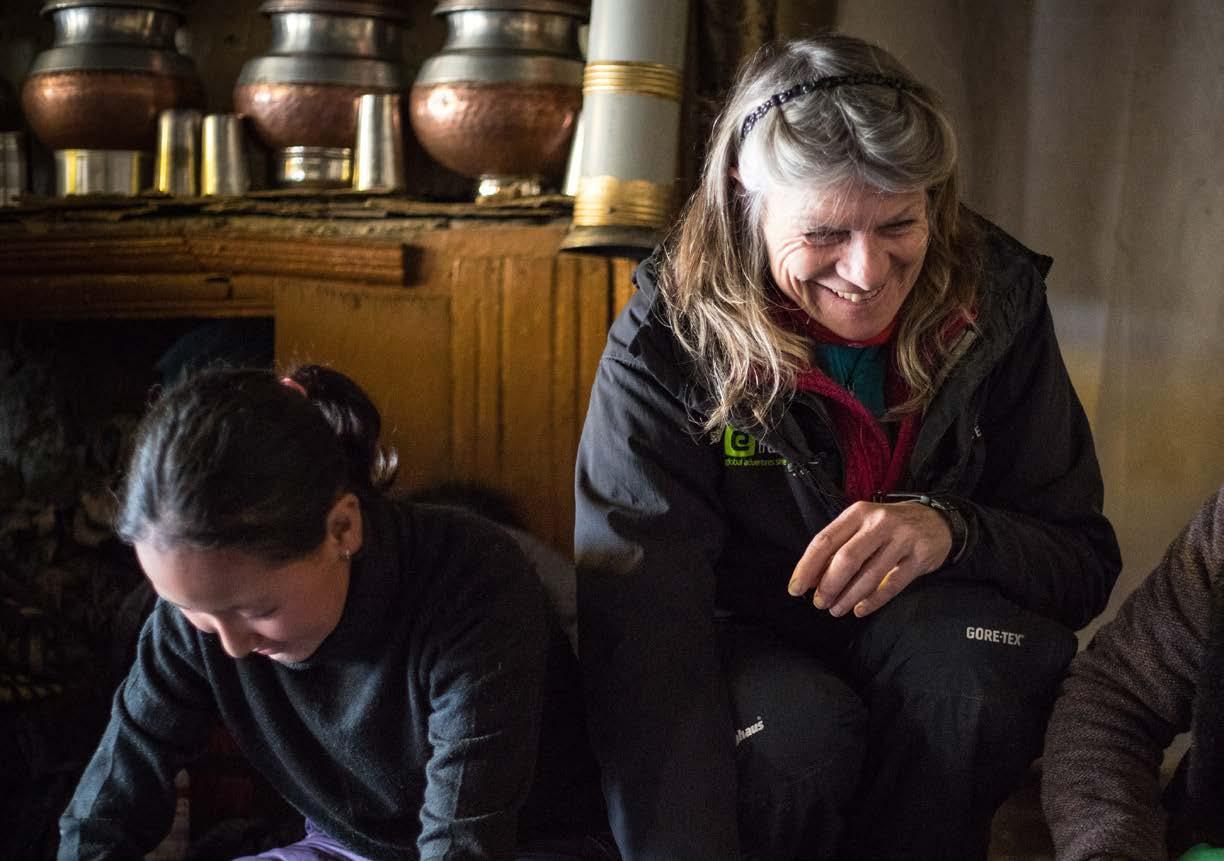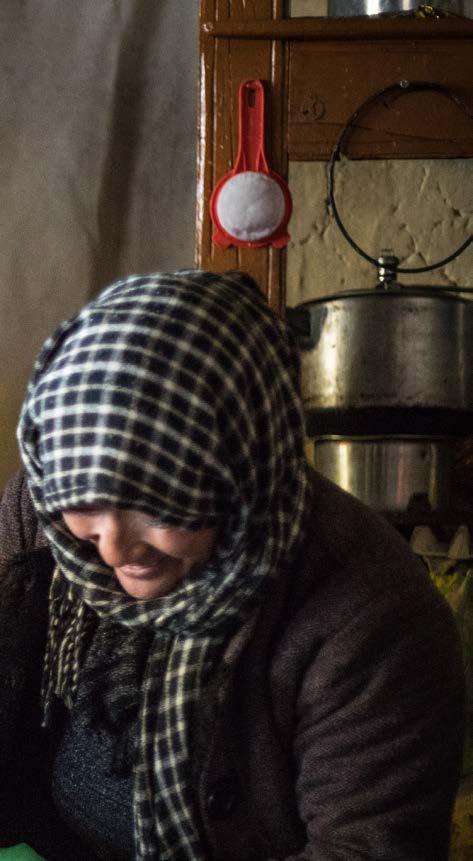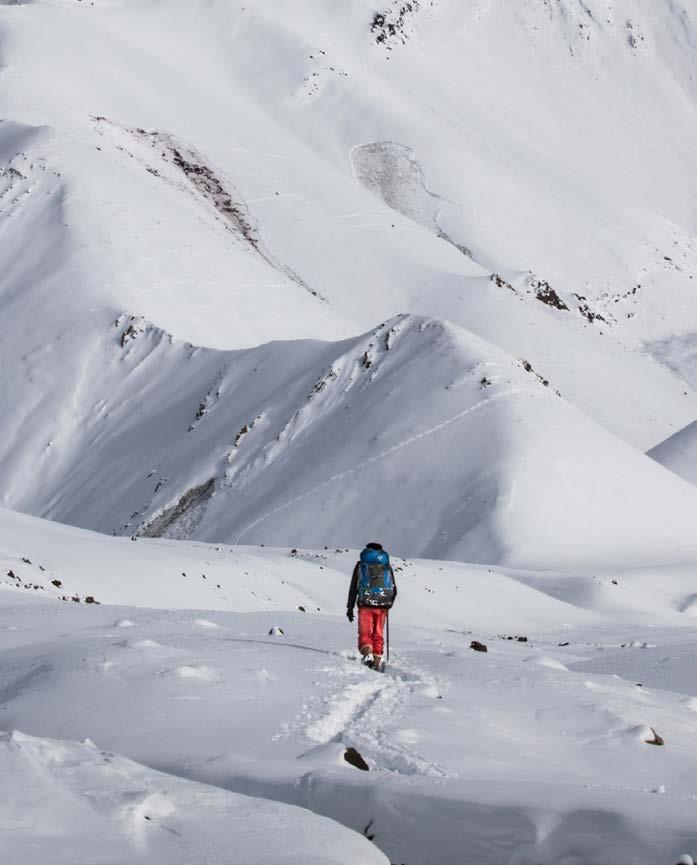
5 minute read
Q&A: VALERIE PARKINSON
Q&A
Valerie Parkinson: A View from the Mountains
The Himalayan region is a place close to our hearts; it’s where Exodus Travels’ journey began. Our long-standing networks there and in-depth knowledge of the region means that we can support isolated mountain communities that large aid organisations often can’t reach. This work is expertly led by Valerie Parkinson, long-standing Exodus Himalayan Tour Leader, who has been travelling amongst these communities for well over 30 years.
VALERIE, WHAT DIFFICULTIES HAVE HIMALAYAN COMMUNITIES FACED SINCE COVID HIT?
Many Himalayan communities survive on money earnt from working in the tourism industry. Many of our local partners and staff (local agents, leaders, guides, assistants, drivers, cooks, pony men, porters etc.) are freelance workers and come from small villages. As well as this on many of our treks we camp or stay in small locally run lodges and guest houses. Money earnt from tourism has allowed many of them to educate their children, pay for any extras or essential services such as medical help, run small businesses, and help their own communities. Since the pandemic hit, income from tourism has disappeared. There has been no government help in the Himalayan communities for those on daily wages, the most vulnerable and those with small family businesses.
GIVEN THESE CHALLENGES, WHAT INITIATIVES HAVE YOU BEEN MOST PLEASED TO BE ABLE TO SUPPORT THIS YEAR?
There have been huge challenges all over the world in this difficult time, but I am pleased to say we have been able to help in several ways in different parts of the Himalaya. The Himalayan Community Projects have always been small grass roots projects where - through our close contacts with people on the ground - we have been able to provide help where needed. During the pandemic I have kept in close contact with our partners in the Himalaya and have been able to find out how we can help. One such project has been Karma’s Food Packages initiative. As there has been no trekking in Nepal since January 2020, our local agent, Karma Lama, began baking bread to sell in Kathmandu. Any left at the end of the day he gave to homeless people who were begging for food or the rubbish collectors who were out collecting rubbish even in lockdown. With the support of the kind donations of our customers, Karma and three of our local leaders – Bikash, Sukman and Kumar - have distributed 2,500 food parcels to the needy in Kathmandu.
Another project we’ve been able to launch in 2020 is our Fruit Tree Project in Ladakh. We have funded the planting of 4,250 fruit trees to provide alternative sources of income for local communities.

Due to lockdowns in India, we were worried the saplings would not be planted but thanks to a huge effort by our partners they managed to plant the saplings out in May 2020.
Despite strict lockdowns in Nepal, we have also been able to continue producing and distributing Freedom Kit Bags. This project is so important for the women of Nepal, where poverty and lack of any source of income (plus lack of knowledge) often means women cannot buy sanitary protection and therefore do not go to school or work. These kit bags gives women the liberty to study, work and take part in life full time.
WHAT KIND OF SUPPORT DO YOU FEEL IS MOST CRUCIAL FOR COMMUNITIES ACROSS LADAKH AND NEPAL IN THE COMING YEAR?
At the moment it is crucial for us to try and support communities across Ladakh and Nepal with basic necessities as well as trying to help provide an alternative source of income. Ultimately though, we are looking forward to the return of responsible tourism to these areas to properly help these communities get back on their feet. Responsible tourism will allow our local leaders and partners and everyone else involved to be able to survive doing what they are well trained to do and are passionate about.
WHAT ARE YOU MOST LOOKING FORWARD TO ABOUT GETTING BACK TO THE HIMALAYA LATER THIS YEAR?
I am looking forward to being able once again to share my passion of the Himalaya and responsible tourism with as many people as I can. I miss the wonderful, clear, high-altitude air of the Himalaya; there is nothing better than camping in the wilds of Ladakh in winter under a clear starlit sky knowing that outside there just might be an elusive snow leopard in the vicinity.
I am also looking forward to seeing the many friends I have made over the last 35 years. The Himalaya has become a second home to me and over 35 years of leading trips, our local partners, leaders, guides, cooks, lodge owners, drivers, pony men and many other staff have become close friends. I have been privileged over the years to meet their families and spend time in their villages and I have seen how they have helped their own communities to thrive.
Being involved with the planning and logistics of all the Himalayan Community Projects over many years has been a great insight into how small, well-run community projects can make a real difference.


Other projects supported in 2020:
THE INCA TRAIL PORTER PROJECT, PERU
Provision of food parcels to 100 families of our porters and other staff in in the Sacred Valley and Cusco.
THE KILIMANJARO PORTER PROJECT, TANZANIA
Dissemination of COVID health information to 7,000 mountain crew, farming or environmental training for 50 porters and a ‘mountain clean-up’ of Kilimanjaro involving 411 mountain crew.
THE LEARNING CENTRE PROJECT, ZAMBIA
Provision of access to educational opportunities and computers for 650 disadvantaged children.
THE FRUIT TREE PROJECT, INDIA
Planting 4,000 fruit trees in Ladakh to provide alternative income, ground and water security, and carbon removal.
THE FREEDOM KIT BAG PROJECT, NEPAL
Distribution of 200 reusable, eco-friendly sanitary protection packs alongside reproductive health education, to minimise the risk of infection whilst combating the stigma of menstruation in the wider community.
THE SANITATION PROJECT, LAOS
Building 26 household sanitation blocks in Na San, so that hygiene, safety and dignity for people in the community can be restored.
DISASTER RELIEF
Donations to the Australian Red Cross and WIRES following the Australian bushfires.




